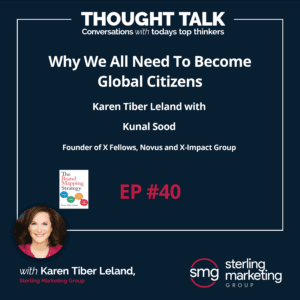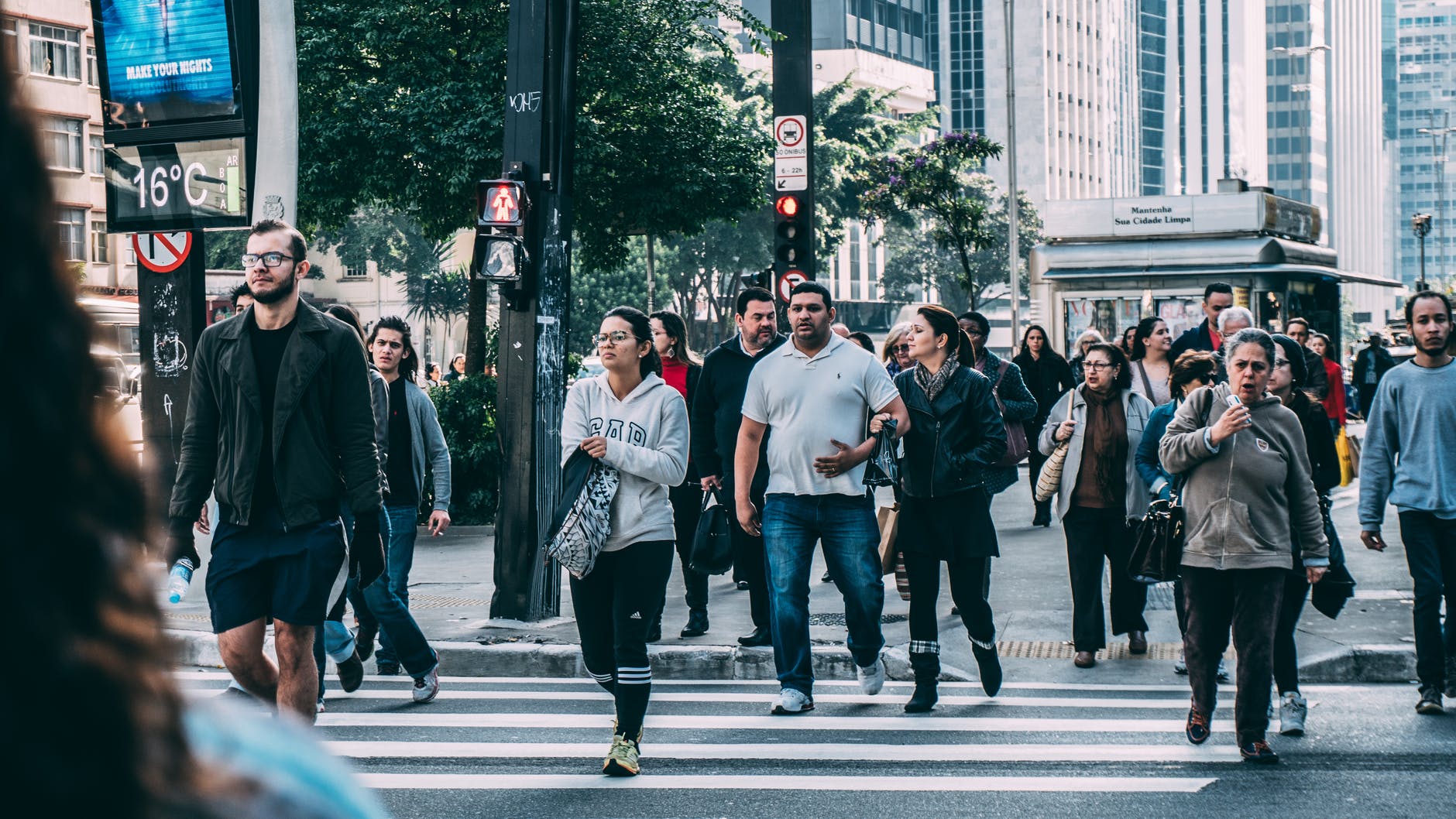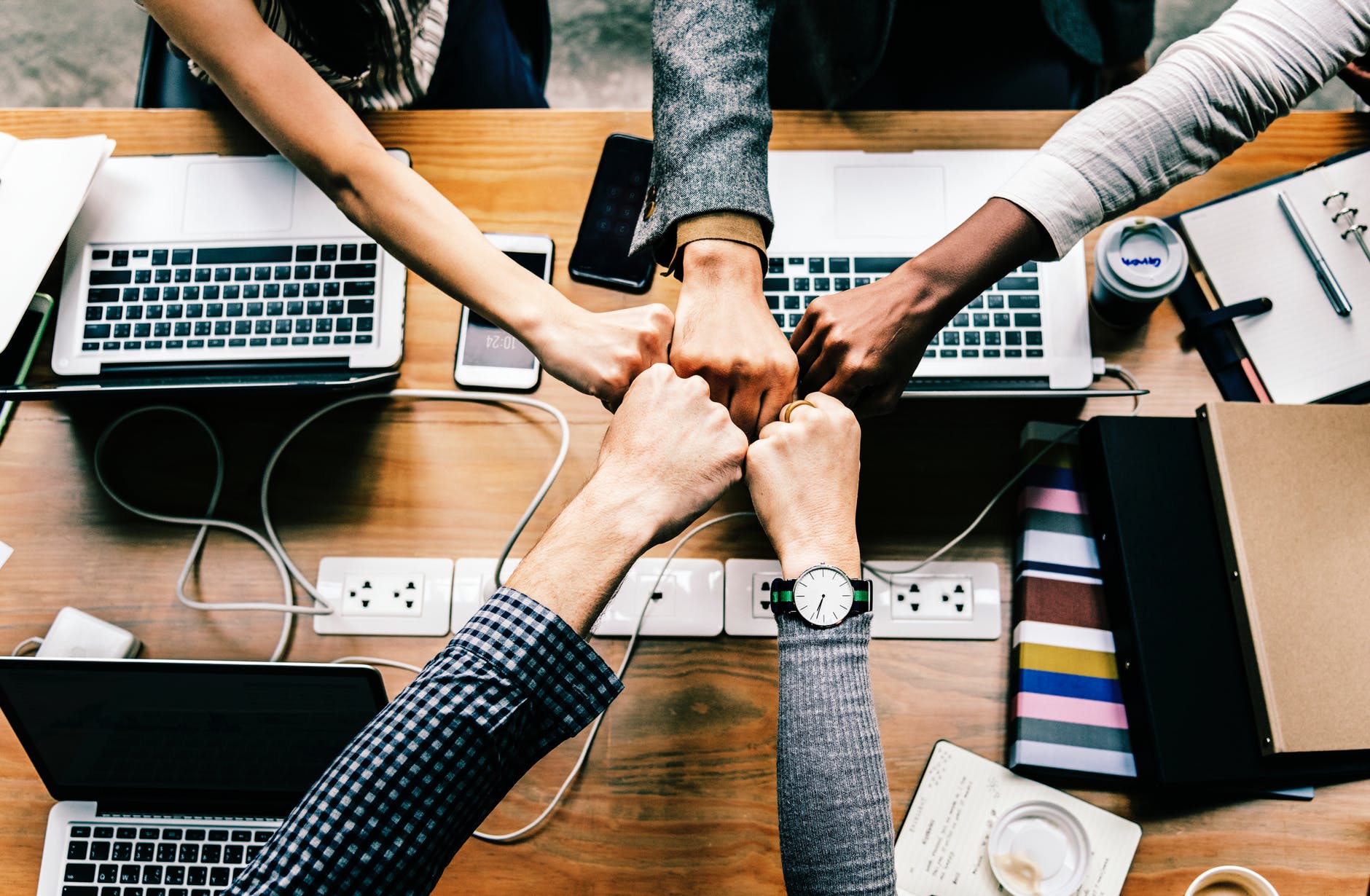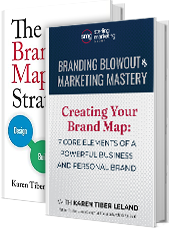Summary:
In “Why We All Need To Become Global Citizens,” Kunal Sood, founder of X Fellows, Novus, and X-Impact Group, emphasizes the transformative power of extraordinary experiences and curated events. Working with both Fortune 500 companies and social enterprises, Sood advocates for global citizenship, aligning with the UN’s Sustainable Development Goals. He stresses the importance of leadership, compassion, and self-mastery in driving positive change, urging individuals to go beyond conventional scripts and embrace their roles as everyday artists in shaping a better world.

As an exponential entrepreneur, social impact strategist, and philanthropic leader, Sood is focused on promoting organizations that make a positive difference to humanity. his steadfast commitment to the field, Sood has received many honors that include the RoundGlass Samsara Lifetime Achievement Award in 2017, and. He has five masters which include an MBA from Kellogg and an MA in Positive Psychology from Penn.
Listen to the podcast on iTunes
Why We All Need To Become Global Citizens
My guest is Kunal Sood. He is the Founder of X Fellows, Novus and X-Impact Group. Sood works with Fortune 500 companies such as Facebook, Google and SAP. He also works with social enterprises like XPRIZE Foundation, Singularity University, TED and United Nations. Kunal has won numerous awards at the UN for his work as a leader in social impact, innovation and in media. He is also a TEDx Speaker and a resident.
Kunal, welcome to Thought Talk.
Thank you. I love Thought Talk.
You’re all about bringing thinkers together, so you’re a perfect person for this podcast.
Thank you. I don’t know about perfect but hopefully a good fit.
You are about experiences and giving people experiences. We were talking earlier, there’s a difference between being a conference producer and a curator. You’ve produced a lot of conferences, you’ve worked for TED at one point, you’ve done your own conferences, but you consider yourself to be more of a curator than a conference producer. Can you talk a little bit about how you see that distinction?
Here’s the funny thing. I’ve never produced conferences ever in my life. I’ve done events. When I was younger I used to do very high-octane fashion shows that the New York Fashion Week 7th on Sixth. I have my own label, so I had a deep dive into the blue ocean effect in my ripe young age. What happened was I learned about TEDx in about 2009. I learned about TED because it came to India and then I learned about TEDx, which is their licensed version. I come off of a being a global health scientist in the slums of Mumbai. When I was there, I was very inspired by what extraordinary stories these unsung heroes on the ground have. Then I looked at TEDx, which was this democratized platform which TED had come up with, and so I was invited to be a guest curator on TEDx San Francisco. That was my first foray into the whole conference world.
I decided to go to different conferences and to experience the different types of genres that exist in that space. That’s when I learned that there’s a massive distinction between TED and just a conference. The trade shows, the conferences of different types, the TEDs of the world, the XPRIZEs of the world, they truly are not conferences. They are experiences that galvanize an extraordinary group of people together to go beyond just business as usual or transaction. At least in my experience, TED is able to give the audience a gift through ideas. When I started dreaming huge, because then that’s how I am engineered, I took all my skill set as a fashion designer and creative director and brought it to this world of ideas worth spreading.
I was very lucky to join forces with a dear friend of mine, Eiso Vaandrager, from Amsterdam and it was amazing. I was in San Francisco, he was in Amsterdam, and we curated to the first ever TedxUNPlaza at the United Nations in New York. That was my beginning into this world, which showed me the difference between a conference and an experience that can truly have a massive transformative impact and inspire purpose in people.
[Tweet “Why everyone needs to be a global citizen and how we can become one.”]
How would you articulate the difference in that experience, between just a conference and then something that’s more of an experience that could be transformational for people’s lives and careers?
I’d say that the things that come out of my formative experiences like TED or XPRIZE or Singularity University, the three that I’m thinking of and hopefully some might even say Novus because I started it, it’s a true story. When people come up to you and say, “You changed my life,” that’s not often what you hear people say at some of these conferences. You might hear that at a Tony Robbins event that is focused on that transformational aspect of humanity. We don’t focus on that draconity. We bring in the forces of nature, be it science, innovation, technology, entertainment, design, you name it, arts, humanity, courage, the Brené Browns and Simon Sineks of the world, the Peter Diamandises, the Martin Seligmans of the world. You bring them all into a room. Curators have a way of being activists in onstage, even though we’re not onstage, we’re behind the scenes.
What we do is we create the conditions for those voices, whether it be a kid from the slums of Mumbai or someone who’s as extraordinary as Peter Diamandis who founded the XPRIZE, to be on the same stage and give them those conditions to fly and have their voices heard where they have never been heard before.
For example, in Novus, when we did it at the General Assembly Hall at the UN, it was a magical space. To me the UN symbolizes something that we all yearn and strive for, most of us at least, which is one world and extraordinary global citizenship. That’s what I’ve made my life’s purpose. My life’s purpose is to create the conditions for anyone to become an extraordinary citizen. That’s what I believe possibly in my view differentiates a conference or a conference organizer from a curator. We strive towards excellence and being extraordinary both in our word and in the way we live and the people’s lives that we touch.
Do you think that businesses can put on conferences that have that high impact and transformation?
100%, especially today more than ever before because businesses have something that most conference organizers, at least the young and hungry and foolish ones don’t have, which is capital resource. The only thing they don’t have is the exponential mindset to go beyond, so they hire someone like TED and pay them to design that experience. I do believe that businesses more than ever before need to do it because it would help the internal ecosystem and thought leadership. I do believe that that’s not only possible but something that needs to happen.
Can you talk a little bit about your current work that you’re doing at Novus and then X Fellows?
Novus was an idea that was inspired by the United States. It was when Trump started his campaign before he became President and he proclaimed that the American dream was dead. That didn’t sit right with me but I didn’t want to be like the others, the naysaying or negative, and I wanted to start a process of deep inquiry. I started Novus with the idea of reimagining the American dream. I did that and I did a small conference in San Francisco at a really interesting space called The Battery, where I invited all of the people I felt had a vested interest in the American dream to share their ideas. It was a massive step for me because I was stepping out of TED. I was stepping out of working for others. I was stepping into my own territory and it was a big risk when you go from serving others to trying to serving something that you want to create yourself. That’s how Novus started. It started as a way to give back to this country for all of the opportunity it has given me. This country is truly extraordinary. To me personally and everything that I’ve done has been empowered and enabled by the virtues of the American dream. That’s how Novus started.

Of course, the success of Novus propelled me again, like TEDx San Francisco to go to TEDx UN. I went to the UN and they were interested in this idea, but they said, “Kunal, if we reimagine the American dream at the UN, the member states will be very upset. We can’t do that.” We envisioned a new mission. Then I made the mission and the vision of Novus to transform the world and we do that by supporting the United Nations Sustainable Development Goals, which are the UN Global Goals, which is seventeen of the most important global grand challenges that we must solve in our lifetime. I’d say in our lifetime because it’s only sixteen years away. 2030 is the year that we’ve given ourselves a mandate to get it done.
We want to serve as the catalyst and champions that not only spread ideas but take people that inspire, live, and achieve their dreams and embody one or several of these global goals and go out and inspire others, almost like a catalyst for transformation for people in our world to take on, own, and become the change you want not only to see but you want to transform into in our world and solve for. More than ever before because of technology, because of innovation, and especially because of the disruptive nature of how we can do things as a group more the globalized sense of community, we can do things that we never did before. We can solve for these global grand challenges that we have listed out like water and hunger.
Women’s empowerment is one of them that I champion. Women are a tour de force for the future existence and humanity. I don’t believe that a woman deserves a seat at the table; she deserves more than a seat at the table, they deserve a new knight’s table. 50% of that table must belong to a woman. I would go so far as being bold to say not only just a seat at the table but have exact equal rights, because if you look at any research that’s been done about women’ approach towards human flourishing, you always see that they have a practical approach towards what’s best for the community.
For me it is not about a seat at the table anymore. It’s about creating a new knight’s stable and that’s what Novus intends to become, as this new knight’s table where we empower men, women, and even the creatures on the planet to rebalance what is off balance, which is how we’ve treated Mother Earth. That’s what I believe. Novus’s job is to serve as that platform and that engagement space where we come together as one to form a super organism.
I’d be curious to hear from you about some of that deep experiences you’ve had and how you feel that they’ve transformed you.
That’s beyond the scope of this podcast. I’ll give you one example. The one thing that transforms people the most is human suffering and loss. I haven’t grown so much in my times of joy and winning an award or being honored. Those are all wonderful accolades that I feel almost appreciative, but the things that have transformed my life have been when I’ve hurt. One such moment was when I lost my late great mentor who was India’s first cardiologist, he committed suicide, and he was like a father to me. He was like a father to all of us in our families, he saved our lives, not just once but the whole country. He saved so many lives in India.
I feel like I personally had failed him when I was not there to save his. I worked by his side. I was very much on a mission to become a cardiologist like him while of course, honoring my family business. When he left me, something cracked open. It wasn’t like these places where I had an epiphany or anything like that. It was a struggle. It was a difficult process of reimagining and relearning everything about my life’s work, journey, purpose and path. I broke open. Since then I’ve focused on living a life that’s about serving others and living a life of service. I miss him a lot and I feel like through his loss, I gained a purpose and vision that I would not have had had I not lost him.
[Tweet “Transformation is about wrestling with those massively difficult moments in your life.”]
For me, transformation is about wrestling with those massively difficult moments in your life and this is one of them. There are so many, but this is one profound moment that I had to wrestle with and it’s not easy. It’s messy. You have to get by with the support you have within as well as around you. You have to have the courage to look within and ask yourself, “Who am I? Why am I here? What can I do to truly have purpose and meaning?” The question that I kept asking myself is “Do I matter? Why am I here?”
Through that I learned how to find deeper meaning and purpose. My achievements have largely been about forming positive relationships and designing extraordinary experiences and trying to create the conditions to help others become extraordinary citizens of the world because I believe in that. It’s not enough to be just a global citizen anymore. Today you can get on Expedia and you’re a global citizen. I’m just saying. We used to pride ourselves on that one point, “I’m a global citizen.” We live here and now in a time where extraordinary citizenship is going to be the type of citizen in the world that’s going to truly shift the narrative, move the needle forward, and have a positive impact on humanity.
Do you feel like that’s something that the ordinary person can do?
100%. If you looked at my past, there was nothing extraordinary about me as a child, although I agree if you ask my mother that she would disagree. Her thinking I was extraordinary is because she loves me, but if you looked at metrics, I wasn’t a kid that grew up with nothing. I didn’t come from poverty. My poverty was of being ostracized, not being part of the community because I was different. I was obese, I was 350 pounds by the time I was sixteen years old. For me, I believe not only ordinary people, but even people that are down and out. In fact, people who are less than ordinary, people that are worse off than ordinary people, can become extraordinary. It’s a continuum and if you have the will, you will find a way. Yes, mentorship, people that love and believe in you always serve to inspire you at that young age, but the ordinary can become extraordinary, absolutely yes.
A lot of the audience of this podcast are entrepreneurs, they’re business people or they work for a company. I’d love to hear some of your thoughts about how you think in a practical way. Some of the ideas you’ve been talking about can be brought into companies in the way companies work.
It depends on which company. It depends on the culture of the company. A lot of what I’m speaking to is about the idea of pour water, chop wood, but get bloody good at it. For me it’s about building grit, because it’s about the individual as well as the team. Within a business setting or an entrepreneurial setting, there are two things that you can control. One is the team dynamic, and so leadership. We have a leadership problem. We don’t have a resources problem, let’s be honest. Most companies, unless you’re a startup, which I respect and have a lot of empathy for, have massive amounts of resources. It’s more about utilizing those resources and effectualyzing teams to not only be effective as a team, but as individuals. You get rid of the free rider effect. That’s what I mean by an extraordinary citizen. You find that signature strength, you do strengths‑based finders tests or whatever, and you start to focus on each other as four wheels versus what’s wrong with the other person.
We are very quick to criticize in today’s world. You go in, you have this experience where you don’t think someone’s pulling their weight on the team then you take the burden on and you do all the work, but then you start negating the relationship. What ends up happening is there’s this chasm of communication breach. There is a breach in communication. I feel that can be avoided through the strengths finders approach towards teambuilding and getting tasks done. Another thing you should do as an extraordinary citizen is always focus to nullify your weakness, not forget it. A lot of people say, “Ignore your weaknesses.” That in my opinion is very dangerous. If your weakness is necessary to the team, then you must strengthen it enough so that it becomes irrelevant, which is different from forgetting about it, and then you accentuate your strengths which would be invaluable to that team.

In a work sense, there are so many permutations and combinations of how one can become an extraordinary citizen within the workplace. We call it entrepreneurship now, but the most effective way is to truly identify your signature strengths and apply them effectively to the team or the role that you serve, and not nullify your weaknesses by forgetting about them but bringing them to a place where they do become irrelevant and don’t hurt the team. Never ever be a free rider.
What do you mean by a free rider?
The idea of the super organism is when all of the team members come into unison and find flow within that. If there’s a free rider, which is a person that’s not pulling their weight and didn’t do the work, it starts to show. That’s where you see the seams tear. They almost become like a parasite. A free rider is that person that didn’t pull its weight, ends up getting lazy because he believes the team is doing so well that, “I don’t need to do as much work.” That ability to always be conscientious and be conscious that you are part of the system and your reason why this system works so well is very important.
The free rider effect is when someone’s there for the ride and not pulling their weight or putting in the effort necessary. That’s something that always has to be in check and that’s why we have a leadership problem today because we need leaders that are both guided by each other as well as themselves. That’s the best way to avoid the free rider effect.
When you talk about being a good company citizen or a good corporate citizen, I don’t think most people think about work in terms of citizenry. That’s an interesting way to put it that you’re a citizen of this company that you are a part of.
The best thing you can do in a company, at least in my view, is to democratize what you’re doing so you become a person that is of service. A lot of businesses are done on a transactional basis, but if you look at it as citizenship, then the transaction can become more of a reciprocity. A lot of businesses have done more harm than good to the large macroeconomic environment. We always talk about how we’re going to burst any minute now. Every economist says that we’re going to burst. Of course, we are living in a time that is way more extraordinary than ever before, disease is down, lifetime expectancy is up.
Cell phones have the same computing power Bill Clinton had when he was President, but those are still only part of the 10% at the top. There is a 90% group of people that still suffer in the world. In fact, a billion of them still live in absolute poverty not knowing whether they will live or die tomorrow. I feel like until we vanquish that, we’ve not succeeded as citizens of our world. That’s why even corporations and people within corporations have to start behaving like citizens of the world and not intrapreneurs or entrepreneurs. It’s very like, “I’m in it to win it” mindset. We’ve thrived on that mindset for too long. We have to reframe those ideas otherwise, the idea of solving all these grand challenges becomes even more difficult.
[Tweet “Corporations and people within corporations have to start behaving like citizens of the world and not intrapreneurs or entrepreneurs.”]
There are a couple of themes on this podcast. One of them I always like to ask people about is what I call the joy of missing out. Often people have a fear of missing out in regards to making a contribution. I’d love to know your opinion what shouldn’t people have a fear of missing out on in regards to making their contribution or being a citizen of the world? What should we have a joy of missing out on as it were in regards to that?
That’s such a fascinating question because you don’t know until you’ve had it, meaning there are so many experiences in life that I’ve had that were unbelievable at the time. One of them was recently I was at this fashion event about fashion design in New York City. I was within the core of the so-called creme de la crème. All the fashionistas, the bitching, and the posing. I’m looking at this and I’m looking at myself and saying, “I have zero fear of missing out on this experience,” because I already have this experience, but at that time I would have had the most amount of FOMO when I was a 25‑year-old, or even a 50-year-old. There were some 50-year-olds over there that were excited and playing the game. I felt like, “What is it about this experience that I have zero attachment to any more?” It was because as you develop massive transformative purpose in your life, fashion starts to become a layer that is exciting and certainly important but not the core of what drives you.
For me the joy of missing out would have been very different at 25 than it is now and I feel like I can miss out on all those things. I don’t have to be on the front cover of Vogue for example. It doesn’t drive my purpose. Putting you on the front cover of Vogue is different.
I’m a little old for the front cover of Vogue.
I’m serious. That’s the perception and that needs to be reframed as well, but my point is I get more joy out of making sure that you get on the front cover because that’s my purpose. I found my purpose. I respect fashion and I love that world of beauty and style, but for me personally, I have no fear of missing out on being seen or in the so-called nexus of the most happening spaces in New York City. I would much rather be at a meeting with people that are planning to solve for hunger or solve for X around a round table that drives the conversation forward around saving our world or changing it for the better at least. I see a lot of joy in doing that versus being in the popular world.
One of the other themes of this podcast, besides the joy of missing out, is what I call living beyond the script. There are a lot of prevailing scripts about what it is to be a woman, about what is to be a man, about what it is to be an entrepreneur, about what it is to be an artist, about what it is to be an American, and about what is to be a human. There are lots of prevailing scripts that we live with. I’d love to hear your opinion on what you think the prevailing script is as it relates to being a citizen of the world and how do we go beyond that script?
Today’s script is truly magnificent because for the first time you can write your own script and you don’t need to be handheld in doing it. You can feel forward, you can be messy, you can show up on YouTube. You have so many mediums of writing the scripts. If you’re not a good writer, you don’t need to sit down with pen and paper. You can do it digitally; you can do it any which way you want to. The scripture for me personally is about being extraordinary, not only being extraordinary within but with each other. That means living in a place of gratitude, living with integrity, being loyal to one another, building and finding ways to be expansively compassionate, leading with a lot of love and respect for others and yourself, and being value-based in how you do things in life.
The script can be written through technology, through media, through pen and paper, but the most important thing is stewardship and leadership, so how we become exponential leaders of our lives and of the work we do in our lives so that we can write a script that matters and is worth sharing with others, that others would be inspired of by and take into their own lives and help them write their own scripts. We live in the age where everyone can write their own script. That is one of the most extraordinary things about going beyond scripts as they used to be seen as scripts in the past.

The last theme of this podcast is what I call the everyday artist. There’s a part of what everyone does regardless of their job title that’s part art and part science. I’d love to know in what way do you consider yourself an artist in your work?
I used to loathe being called an artist in design school. I went to Parsons School of Design, the best art school in the world according to legend, especially in fashion. As I’ve grown to mature, I embraced that word, because art is truly when you go beyond science. In some ways you cannot measure art the same way you do science. There’s a saying when I was a global head scientist, which was, “If you can’t measure it, it doesn’t exist.” That’s a very scientific belief but when it’s good art, you don’t give a crap about measurement. You are just in a place of awe and wonder when you witness it and that’s why we cry at the movies or we see the idea of something like Wakanda and dream for the African-American people.
Artistry is about that self-mastery, and mastery of not just the self but mastery of the vision and the dream we all have individually and collectively. That’s what true artistry is about, when visions become real possibility. I personally in recent past embraced and almost feel deeply honored when people say, “You’re an artist,” because that’s probably one of the best things a person can tell you and truly mean it. Being an artist is no joke. It’s hard work. It’s a gift not only to yourself, but to humanity if you can be a true artist of life. Da Vinci, we can name them, the greats of the past, they’ve done something right, so I embrace the artist within.
Kunal Sood, thank you so much.
Thank you.
My guest has been Kunal Sood. He is the Founder of X fellows, Novus, and X-Impact Group. You can find out more about him at www.NOV.us and it www.XFellows.com.
Important Links
- X Fellows
- Novus
- X-Impact Group
- Eiso Vaandrager
- TedxUNPlaza
- The Battery
- United Nations Sustainable Development Goals
- www.NOV.us
- www.XFellows.com
- Kunal Sood – TEDx Speaker
About Kunal Sood
 Kunal Sood is the Founder of X Fellows, Novus and X-Impact Group, Sood works with Fortune 500 companies such as Facebook, Google, and SAP, as well as social enterprises like X Prize Foundation, Singularity University , TED and United Nations. He has won numerous awards at the UN for his work as a leader in social impact, innovation, and media. Sood is also a TED Speaker and Resident. www.nov.us, www.xfellows.com
Kunal Sood is the Founder of X Fellows, Novus and X-Impact Group, Sood works with Fortune 500 companies such as Facebook, Google, and SAP, as well as social enterprises like X Prize Foundation, Singularity University , TED and United Nations. He has won numerous awards at the UN for his work as a leader in social impact, innovation, and media. Sood is also a TED Speaker and Resident. www.nov.us, www.xfellows.com
As an exponential entrepreneur, social impact strategist, and philanthropic leader, Sood is focused on promoting organizations that make a positive difference to humanity. his steadfast commitment to the field, Sood has received many honors that include the RoundGlass Samsara Lifetime Achievement Award in 2017, and. He has five masters which include an MBA from Kellogg and an MA in Positive Psychology from Penn.
